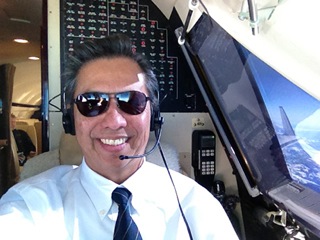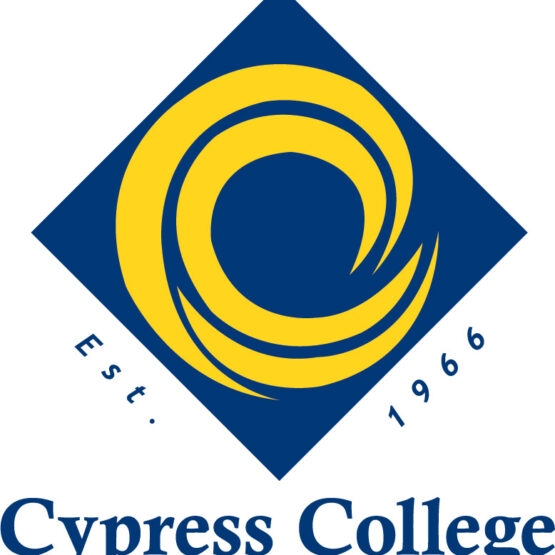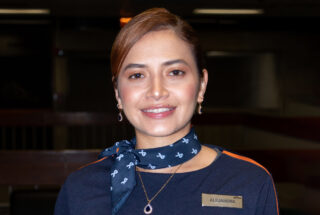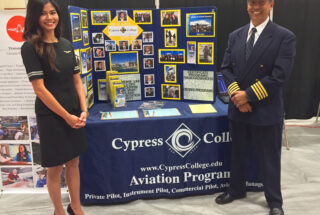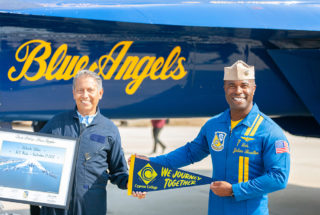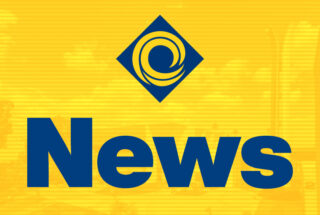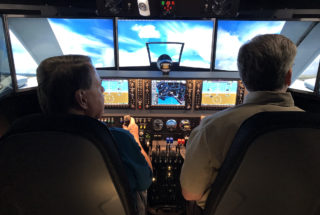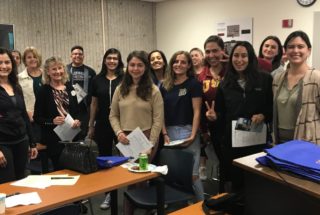Please know that there are no academic prerequisites to begin this program; however, there are job requirements that you should review before you begin your coursework. Some of the job requirements are specific and limiting; for example, if you want to be a flight attendant, and an airline says you cannot be taller than 5’9″ and you are 5’10” then you will not receive an offer employment because that particular airline operates smaller aircraft, and you would be constantly hitting your head. We want to make sure you are aware of some of these requirements before you devote time and money to the career listed below, so we have listed a SAMPLE job announcement. While some companies will have different requirements, you may want to investigate your options and talk privately to your instructor if you have any concerns or questions.
Minimum Qualifications:
Requirements vary by airline, but here are some general guidelines for the minimum qualifications for flight attendants:
•19 – 21 minimum age (the average hiring age is much higher)
•5’ – 5’2″ minimum height (able to reach 82” to 84” depending upon airline)
•6’ to 6’2” maximum height (some airlines have no height maximum)
•Vision correctable to 20/30 or 20/40 for some airlines (glasses or contacts are okay)
•Weight in proportion to height (you must fit on the jumpseat)
•Healthy: both physically and in appearance (teeth–straight and white)
•No visible tattoos or piercings (one pierced earring per ear for women)
•High school graduate or GED
•Fluent in English (good grammar, diction, and enunciation)
•Passport (permanent resident visa)
•U.S. Citizen/permanent resident or alien with the legal right to work in the U.S.
•Social Security Card
•Drug, alcohol, and security screen
•Able to relocate
Preferred Qualifications:
Most airlines list preferred qualifications that, at times, can appear to be more like minimum qualifications because they screen for these qualifications and may not consider anyone who does not possess them:
•Two years of college
•Two years of customer service experience
•Conversant in a second language (test required)
•Customer recovery experience
•First Aid and CPR
•Basic math and reading, writing, and speaking skills (refer to skill tests)
•Some airlines require ability to swim 90 feet fully clothed
•Key personal characteristics recruiters may look for include: ◦Outgoing personality, positive attitude, and compassion
◦Reliable, responsible, competent
◦Self-directed: ability to initiate conversations, work unsupervised
◦Well-groomed
◦Critical thinking skills and ability to solve problems
◦Flexibility
Note: Alaska has been known to require you be a non-user of nicotine for the past 6 months.
SAMPLE United Airlines Job Announcement (2018):
At United we recognize that one of our greatest assets is our people. The rich diversity of cultural backgrounds, life experiences, ideas, and lifestyles represented by United employees allow us to provide the best possible service to our global customers. We differentiate ourselves from our competitors by creating a more flyer-friendly experience utilizing technology and customer service. Guided by our four service principles (be predictable, be the solution, be gracious and be the brand), United flight attendants perform vital safety, security and service related duties while interacting with a diverse group of customers and coworkers. We offer everything you need to build the career you have always wanted. Welcome to the friendly skies!
Why join the United flyer-friendly team in?
•Explore the world with your friends and family through the employee travel program, offering nearly 5,000 daily flights to over 350 exciting destinations on 5 continents
•Rewards for perfect attendance
•Monthly bonuses for meeting customer satisfaction, arrival and departure targets
•Competitive benefits package which includes medical, dental and vision insurance programs as well as vacation and sick time
•Optional enrollment in our 401(k) program
•Dedication to equality and diversity in the workplace
•Community outreach and volunteer opportunities
•Company wide commitment to the environment through the Eco-Skies program
•Company wide focus on service and technology
•Industry discounts on air travel, car rentals, hotels, cruises, electronics and more
What qualities do successful United flight attendants possess?
United flight attendants are our most highly visible employees. The genuine friendliness and quality of service provided by our flight attendants greatly influences our customers’ perception of United.
United flight attendants:
•Perform duties in the confines of aircraft cabins and galleys
•Experience the environmental effects of G-forces, dry air, high noise levels, dim lighting, and turbulence
•Ensure customer safety and comfort while delivering a consistently gracious service
•Work independently without supervision and as part of a team
•Ensure compliance with Federal Aviation Administration regulations
•Prepare and serve meals, snacks, alcohol, non-alcoholic beverages and conduct onboard sales of food, liquor and duty free items
•Assist customers and respond to onboard medical situations
•Provide leadership and maintain order during high stress situations including aircraft evacuation, security threats, delays, severe weather conditions, and turbulence, etc.
•Maintain a professional, composed public image while complying with United grooming and uniform standards
•Maintain a lifestyle free from alcohol abuse and illegal drug use
Successful flight attendant applicants:
•Remain friendly, polite and committed to delivering exceptional customer service
•Exercise good judgment and display exceptional interpersonal skills
•Are dependable, punctual, and display a strong work ethic
•Are caring, nurturing and handle stressful situations with grace
•Accept personal responsibility for resolving conflicts
•Possess the physical agility and strength to assist customers and perform all necessary safety functions
•Exhibit refined communication skills and maintain a neat, professional appearance while adhering to United’s uniform and grooming guidelines
•Must not display any visible tattoos while in uniform (examples of visible tattoos include but are not limited to tattoos on the hands, arms, neck, face, legs and feet)
What are the minimum job requirements?
•Must be 21 years of age or older
•Must fall within the minimum height requirement of 5’0” and maximum height requirement of 6’3” without shoes
•Must be height and weight proportionate to maintain a professional appearance; body size cannot exceed specific aircraft dimensions (example: jumpseat harness without modification, cabin aisle and emergency exits)
•Must pass a vision test (each eye must be 20/40 or better corrected for both far and near vision)
•Must have normal middle ear function
•Must pass a hearing test (no loss on audiometry in better ear greater than 40 dB when losses at 500, 1000, and 2000 Hz are averaged)
•Must possess a high school diploma or equivalent with secondary education or college preferred
•Must possess basic computer literacy and math competency
•Must have at least two years of direct customer service experience
•Must read, write, speak, and understand English
•Must maintain excellent attendance as regular, reliable attendance is an essential requirement of the position
•Must push and pull beverage/meal carts (150-250lbs); lift liquor kits (up to 43lbs)
•Must be able to lift emergency window exits (up to 60lbs); open emergency doors (91-126lbs)
•Must stand, walk, kneel, bend, stoop, stretch, reach, lift heavy objects from the floor to above shoulder-level, and push and pull equipment.
•Must possess and maintain a valid United States passport or foreign passport with applicable visas and eligibility to work in the United States
•Must pass the FAA-required ten-year work history review, a criminal background check, complete DOT fingerprinting, physical exam, drug screening and submit to random drug and alcohol testing throughout their career
•Must complete and pass a pre-employment examination revealing no physical or mental limitations that would impair ability to perform routine or emergency duties (with or without a reasonable accommodation)
•Must pass a rigorous six week training program
•Must be able to travel freely within the United States and without restriction to all countries United serves
•Some countries place entry restrictions on foreign visitors. For instance, Canada prohibits entry to people who have been convicted of criminal offenses or who have criminal charges currently pending against them. Some convictions that make a person inadmissible for entry into Canada include theft, driving while intoxicated (DWI) and a number of felonies and misdemeanors. There are procedures to seek special permission or waivers from Canada to permit entry, but these are not automatic. This is not a complete list of countries with restrictions.
Relocation:
•Must accept assignment to any of United’s flight attendant bases and cover your relocation costs
•Must live within driving radius of your assigned base
•Must have access to reliable transportation to and from the airport
Non-traditional Work Schedule:
•Must be willing to work on reserve status as determined by United’s operational needs
•Must be able to report for duty with limited notice
•Must be available for duty assignments on a 24 hour basis
•Reserve flight attendants will be assigned a schedule with a contractual minimum number of days off
•Must be willing to fly domestic and international flights and be away from base for up to six days at a time
•Must be willing to work nights, weekends, holidays and extended hours
Uniforms:
•Must purchase the initial set of uniform pieces and luggage (approximately $720 with a payment plan)
•Annual replacement of uniform pieces will be provided by United
Salary:
•First year pay $26.68 with annual increases up to $67.11 per hour
•Per diem of $2.20-$2.70 per hour for all trips
•Reserve pay guarantee of 78-83 hours per month
•Additional compensation for use of designated language skills, position override (lead/purser and galley positions) and international trips
**Important note: Ensure you have a valid email address and check that you have entered it correctly. All communication, including the status of your application, will be sent via email. **
If you have interviewed with us before, you must wait six (6) months from your interview to reapply. Please do not create more than one application as this could jeopardize your candidacy.
If you meet all of the above-mentioned qualifications and can comply with the employment conditions, please click to apply and begin the application process. You will be asked to submit your contact information, attach a resume, complete an online application and answer job-related questions.
This summary of minimum job requirements is not to be interpreted as a comprehensive list. Additional job requirements may be added as required by the operational needs of United.

